MercoPress. South Atlantic News Agency
Tag: International Monetary Fund
-
Tuesday, May 28th 2019 - 09:35 UTC
IMF contradicts Trump: US companies and consumers are paying for the higher tariffs on Chinese imports
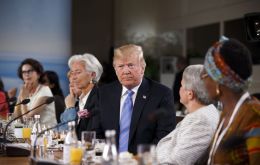
Companies in the United States are paying almost all the costs from tariffs on Chinese imports, International Monetary Fund (IMF) researchers said in findings that contradict US President Donald Trump's assertions that China is footing the bill.
-
Tuesday, April 30th 2019 - 09:59 UTC
Argentine Peso gains strength as IMF agrees to more central bank flexibility
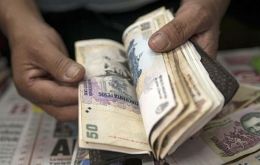
Argentina’s embattled peso gained strength on Monday after the central bank said it would ease limits on its foreign exchange market interventions, signaling its willingness to sell reserves in an effort to better control the volatility of the local currency. The peso began the session up 3.37% and closed 3.56% stronger at 44.37 per U.S. dollar.
-
Friday, April 26th 2019 - 09:59 UTC
Second black day for Argentine markets and Peso; panic at a possible return of Cristina Fernandez and Kirchnerism
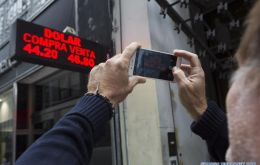
Argentine bonds and the country’s embattled peso currency fell for a second day on Thursday, cranking up the challenge facing President Mauricio Macri as his drop in the polls ahead of knife-edge elections later this year unnerves investors.
-
Wednesday, April 24th 2019 - 09:15 UTC
IMF also concerned with the increase in the poverty rate in Argentina

An official with the International Monetary Fund has declared that the increase in the poverty rate in Argentina could force the government to rethink its spending plans and “protect the poor.”
-
Tuesday, April 23rd 2019 - 09:18 UTC
Argentina managed a quarterly primary surplus during the first quarter
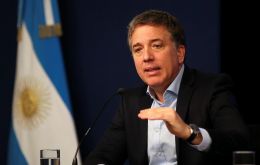
Argentina ran a primary fiscal deficit of 13.037 billion pesos (US$ 305.32 million) in March, the country’s Treasury minister Nicolás Dujovne said at a press conference on Monday, though posted a first-quarter surplus of 10.347 billion pesos.
-
Thursday, April 18th 2019 - 09:44 UTC
Macri announces freeze in the price of basic goods and in public services
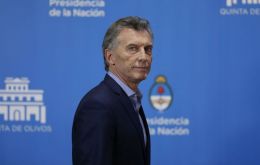
Argentina's President Mauricio Macri announced a freeze in the price of basic goods and public services on Wednesday in a bid to limit the impact of spiraling inflation that could hamper his re-election hopes in October. Hit by soaring prices due to inflation that reached almost 55% over the last 12 months, many Argentines have been calling for a change in economic policy.
-
Wednesday, April 17th 2019 - 09:58 UTC
Argentina's inflation 54.7% in 12-months; more monetary “contraction measures” and support from IMF

Argentina's inflation rate accelerated for the third straight month in March, the government statistics agency said on Tuesday, prompting the central bank to unveil fresh measures to temper raging inflation and protect the embattled peso currency.
-
Friday, April 12th 2019 - 09:28 UTC
IMF's Lagarde glad a chaotic Brexit was avoided but warns about a prolonged uncertainty impact

Further uncertainty over Brexit will hinder growth in the UK economy, the head of IMF has told the BBC. Speaking ahead of the agreement of an extension to Article 50, Christine Lagarde warned that businesses and investors will remain hesitant in the coming months. She said any prolonged uncertainty would have a “negative impact”.
-
Wednesday, April 10th 2019 - 09:19 UTC
IMF cuts global 2019 growth; suggests rich countries should prop their economies

The International Monetary Fund on Tuesday cut its global economic growth forecasts for 2019 and warned growth could slow further due to trade tensions and a potentially disorderly British exit from the European Union.
-
Tuesday, April 9th 2019 - 09:59 UTC
Argentina's Peso takes a rest after a hectic week but the country risk shoots to its highest this year
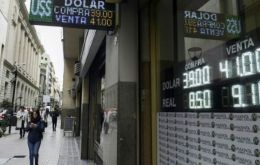
Latin American stocks were flat on Monday, partly subdued by delays in important pension reform in Brazil, while currencies in the region rose against a weak dollar but Argentina's peso hovered around record-low levels on political uncertainty and the highest country risk so far this year.
